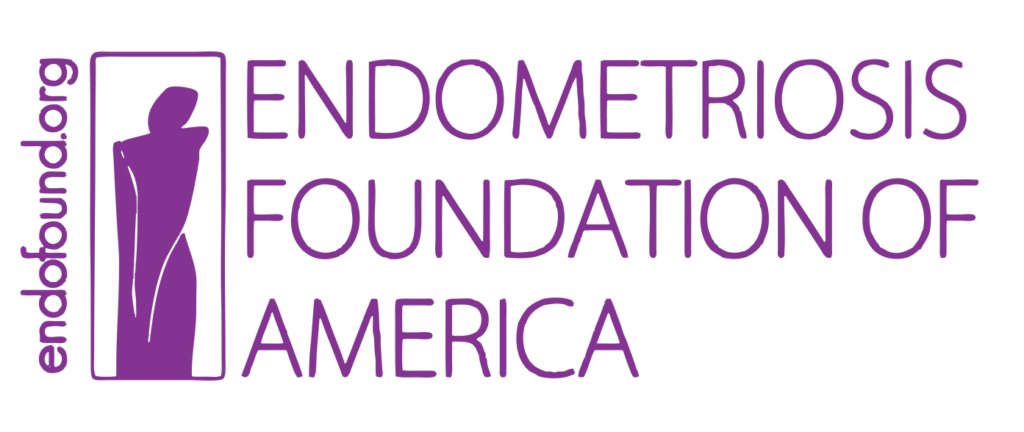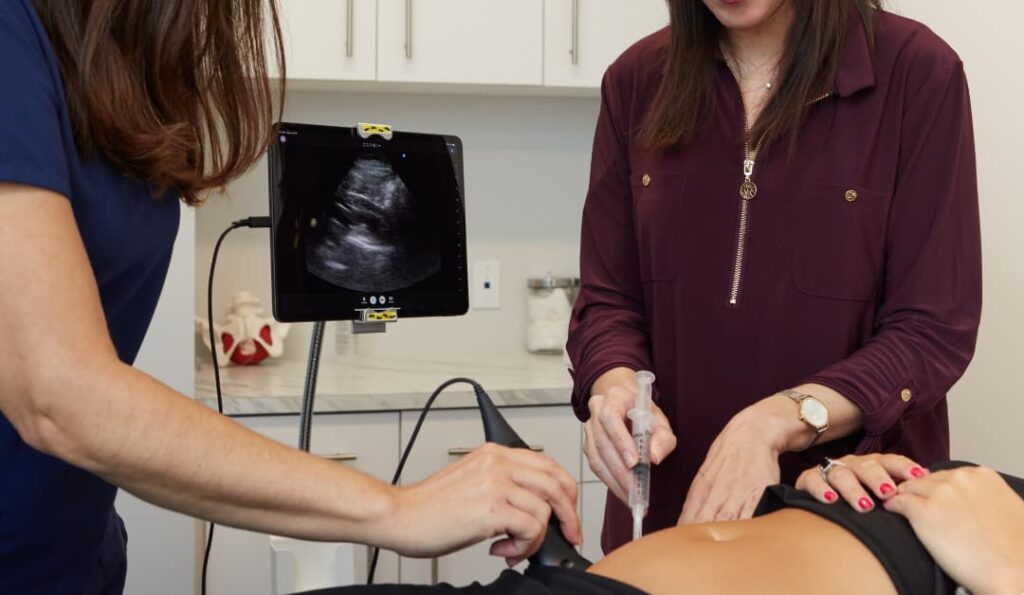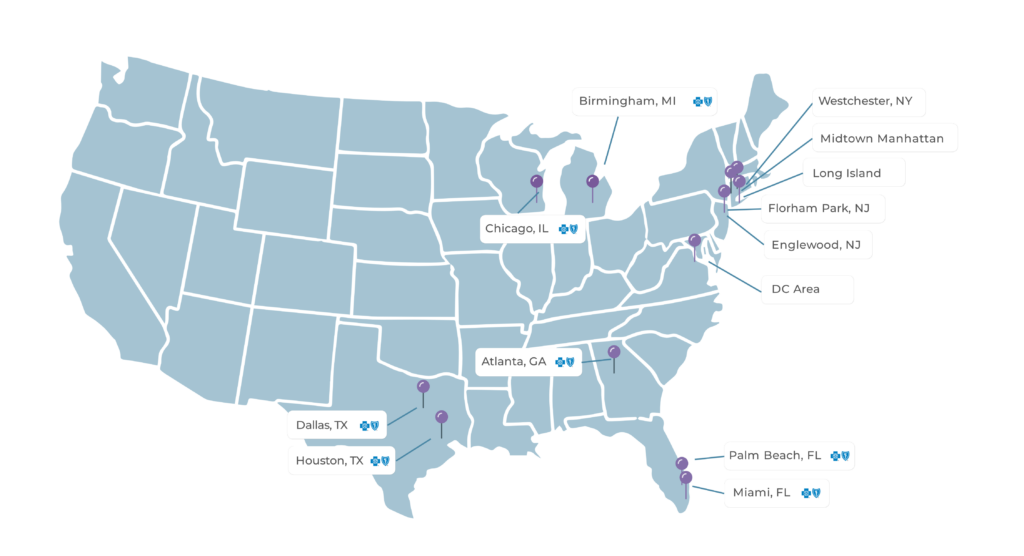If you suffer from endometriosis or pelvic pain, we can help reduce your pain and increase functionality.
We are pelvic pain specialists in Dallas, TX, who offer quick, effective non-operative treatments for endometriosis and other pelvic conditions.
At our Dallas location, we also provide endometriosis excision surgery with Dr.Amro Elfeky, MD, FACOG. Don’t wait; call us today to learn about your treatment options.
Schedule Your Appointment Today
Our Doctors have been featured in...








Having pain from endometriosis and other conditions in the pelvic area, such as pain during sex or when using the bathroom, is more common than you might think and affects about 1 in 7 women. Many go for years undiagnosed or misdiagnosed and undergo unnecessary medical procedures that can be harmful and expensive, without resolving their issues.
Living with the pain can severely affect quality of life, including physical function, psychological well-being, and interpersonal relationships.


On average, women with endometriosis make 7 visits to their primary care provider before being referred to a specialist.

Nearly 75% of women with endometriosis have had a misdiagnosis.

On average, women experience a delay of 7-12 years from the onset of symptoms to a surgical diagnosis.

Women with endometriosis average 2 – 5 surgical procedures related to their diagnosis, often with minimal sustained improvement in symptoms.


Services We Offer in Dallas...
The difficult thing about endometriosis is that if it is suspected, the only way to diagnose it is by surgical excision with histopathological confirmation. Typically, a laparoscopy is performed to diagnose endometriosis, and often it will involve excision of the disease. Once we have excised the disease, management of the disease usually entails medication therapies, such as anti-inflammatories, hormonal suppression, and lifestyle modifications, such as behavioral health and nutritional approaches..
If endometriosis is suspected, and you would like surgery as a treatment or management option, our highly skilled surgeons can perform endometriosis laparoscopic surgery, which is considered the gold standard, and involves cutting out the lesions, implants, or fibrosis (scar tissue) caused by endometriosis.
PRM Protocol™ & Pre-Hab
The PRM Protocol™ consists of a series of pelvic nerve and muscle treatments to target inflammation in the pelvis, nerve pain and pelvic floor muscle spasm. With the PRM Protocol™, we Reverse the inflammatory cascade caused by chronic pain conditions, Reset the pelvic environment for pain-free living, and Retrain the pelvic floor nerves and muscles for optimal functionality.
Pre-hab refers to optimizing your pelvic nerves and muscles before surgery, making them the best they can be so that you can bounce back faster after surgery.
When your nerves are inflamed and irritated from having the endometriosis in your pelvis, this can cause persistent pain you may be experiencing. The importance of the PRM Protocol™ prior to surgery is that we are calming the nerves and decreasing as much inflammation as possible, so you will respond to your surgery better and have smoother recovery.
This means using less medications, returning to your normal daily activities such as work, intercourse, exercise, and even sleeping – as soon as possible.
Endometriosis Excision Surgery
Excision surgery involves excising endometriosis lesions in the body. These lesions cause pain and inflammation, so removing them is a vital step in managing the disease. We use the latest in excision technology, such as our robotic-assisted da Vinci surgerical system. Pelvic Rehabilitation Medicine is proud to have three endometriosis excision surgeons (and growing) on staff, out of only 100 available in the world. Each is fellowship-trained and have worked on complex excision cases.
Post-Surgery Treatment (Post-Hab)
Post-habilitation through the PRM Protocol™ helps patients recover from surgery and prolongs the positive effects of excision.
Post-habilitation specifically targets surgeries for endometriosis, ensuring optimal healing conditions for nerves and muscles. Our approach focuses on restorative care to facilitate the return of pelvic floor muscles to their baseline state, reducing spasticity, strengthening pelvic support, and promoting enhanced nerve function for improved post-operative wellness.
Endometriosis Excision Surgery in Dallas
Excision surgery involves cutting out the lesions, implants, or fibrosis (scar tissue) caused by endometriosis.
Although excision surgery is more effective, the procedure is more technically difficult and time-consuming. Complete removal of all visible diseased tissue makes this the best treatment currently available. Furthermore, with this type of surgery, the specimen removed from surgery can be sent to the pathology department where confirmation can be made that it is indeed endometriosis and not a different type of disease. Our Endometriosis Excision Surgeons have completed extensive Mayo Clinic fellowships and are experts in their field of diagnosis and treatment.
Your recovery process depends on your baseline health and fitness, plus the severity of your disease – but we are here to help you through it.
In general, for the first couple of days after surgery, you may experience bloating and discomfort from the gas that was used to distend your abdominal cavity for the laparoscopy.
You will also have some cramping and post-operative soreness/tenderness. This should improve by the third day, after which you should be feeling better. It is very important that you call us after surgery if you don’t feel better each day compared to the previous day.
Within two weeks, you should be feeling almost 90% back to normal. At this time, you will have a follow-up office visit to ensure all is well and to check your abdominal incisions, which by this time should be almost completely healed. Your surgeon will discuss with you the surgical findings and the follow-up treatment plans.
Dr. Rachael Haverland is an experienced female healthcare provider specializing in women’s fertility and pelvic pain issues through minimally invasive surgery. With a distinguished academic background, she has proven expertise in treating endometriosis, pelvic pain, fibroids, and pelvic floor issues. Her approach is patient-centric, seeking to inspire confidence and help women become their best selves. Dr. Haverland provides quality care to her endometriosis patients in Texas, prioritizing as a goal to listen and fully understand every concern and symptom. She believes in a collaborative and multidisciplinary approach to achieve the best possible outcomes for her patients’ quality of life.
What Patients are Saying

A whole-body approach to endometriosis and pelvic pain.
There are many ways to manage and treat endometriosis, which includes non-operative approaches, and approaches that do not include opioids or hormones if you are seeking this.
At PRM, we believe that endo patients deserve options when it comes to their treatment:
The PRM Protocol™
The PRM Protocol™ is a proprietary, patented, simple, office-based procedure to treat the symptoms of chronic abdominal pelvic pain by a direct treatment of inflamed pelvic nerves and spastic pelvic muscles which are often the root cause of symptoms.
Managed Pelvic Floor Physical Therapy
Our providers provide Expert Medical Guidance when collaborating with Physical Therapy to optimize outcomes.
Peripheral Nerve Block
Performed to release nerve tension, reduce neurogenic inflammation, and desensitize hyperactive pelvic nerves.
Non-Opioid Pharmacologic Management
Proactive identification, assessment and treatment of nerve pain, muscle pain, bladder and bowel dysfunction.

Break the Pain Cycle
The good news is that, although suffering from endometriosis and other pelvic pain conditions is very common, you don’t have to suffer in silence.
At Pelvic Rehabilitation Medicine, 70% of our female patients have endometriosis. Many arrive at our clinics with symptoms of endometriosis without a diagnosis or any knowledge of the disease. Our providers are on the “front lines” of educating patients and healthcare providers throughout the country on the disease process.
We are the experts in pelvic pain with 13 clinics nationwide and an expert staff of physicians and other specialists dedicated to helping patients like you enjoy an active, pain free lifestyle. We treat both male and female patients who experience core muscle and nerve problems; chronic pelvic pain; and pelvic floor muscle dysfunction.
Our physicians take an innovative approach, combining traditional medicine with holistic modalities and restorative and rehabilitation medicine. We treat both s who experience core muscle and nerve problems; chronic pelvic pain; and pelvic floor muscle dysfunction.
When you become our patient, you receive our full attention. First, we listen intently and empathetically to your concerns. Then, we perform a careful examination and may conduct tests to ensure a precise and accurate diagnosis. Finally, we design a treatment plan tailored to your individual needs. Our goal is to help you enjoy an active, pain free lifestyle.
Meet Allyson Shrikhande
Chief Medical Officer & Co-Founder
Dr. Allyson Shrikhande, a board-certified Physical Medicine and Rehabilitation specialist, works with other experts to develop training modules for residents and physicians interested in learning about the diagnosis, treatment, and management of chronic pelvic pain.
Through PRM, Dr. Ally aims to increase access to diagnosis and treatment for patients who have been dismissed and left to suffer in silence for too long – an experience she knows all too well herself, as PRM’s first patient.

Our Dallas Location
Our Address
9301 N. Central Expressway
Suite 560
Dallas, TX, 75231
Hours of Operation
Monday – Thursday 9:00 AM – 5:00 PM
Friday 8:30 AM – 2:30 PM
Visit Our 14 Other Locations
And we Take Insurance
We are pleased to announce we are now in-network with Blue Cross Blue Shield (BCBS) in Florida, Texas, Illinois, Maryland, Michigan, and Georgia.
Not in one of those states? No problem. We accept all insurances on an out-of-network basis. We believe that access to care should be a basic right and work hard to ensure all of our patients can access the treatment they need, even offering self-pay options.
Our physicians take an innovative approach, combining traditional medicine with holistic modalities and restorative and rehabilitation medicine. We treat both male and female patients who experience core muscle and nerve problems; chronic pelvic pain; and pelvic floor muscle dysfunction.
